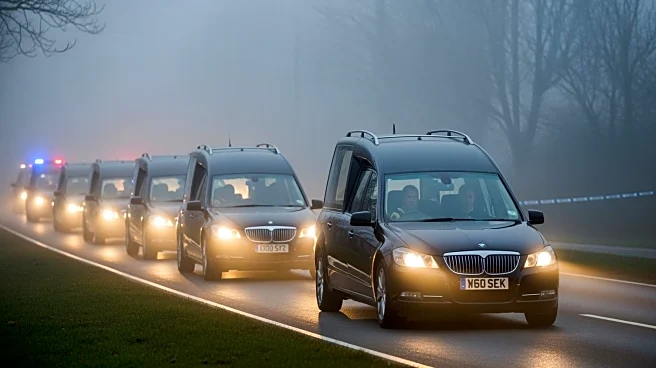What's Happening?
Funeral directors in Pontyclun, Rhondda Cynon Taf, have reported a troubling increase in road rage incidents involving funeral processions. Geraint Griffiths, a local funeral director, highlighted a recent
incident where a hearse was side-swiped, causing a delay in the funeral and resulting in £20,000 worth of damage. Such incidents are reportedly occurring on a weekly basis, with drivers often becoming abusive. The National Association of Funeral Directors (NAFD) has noted this as a growing problem across the UK. Funeral directors are urging drivers to show respect and patience, treating funeral corteges like trains on the road to allow families to remain together during the procession.
Why It's Important?
The increase in road rage incidents during funeral processions highlights a broader societal issue of declining respect and patience on the roads. This trend not only causes emotional distress to grieving families but also poses safety risks, particularly when horse-drawn carriages are involved. The NAFD emphasizes the importance of maintaining traditions of respect for funeral corteges, which serve as a moment of dignity for the deceased and their families. The lack of respect can lead to dangerous situations, as horses can be easily spooked, and funeral directors walking in front of hearses are at risk. Addressing this issue is crucial for ensuring the safety and emotional well-being of those involved in funeral processions.
What's Next?
Funeral directors are likely to continue advocating for greater awareness and respect for funeral processions among drivers. This may involve public awareness campaigns or collaborations with local authorities to enforce traffic regulations that protect funeral corteges. The NAFD may also push for legislative measures to ensure the safety and respect of funeral processions. Additionally, funeral directors might explore technological solutions, such as enhanced signaling on hearses, to alert drivers and prevent incidents.
Beyond the Headlines
The rise in road rage incidents during funeral processions may reflect broader cultural shifts towards impatience and individualism in society. This trend could have long-term implications for how communities engage with traditional practices and rituals. The issue also raises ethical questions about the balance between individual convenience and communal respect, particularly in moments of collective mourning. Addressing these cultural dimensions may require a reevaluation of societal values and the reinforcement of community-oriented behaviors.









